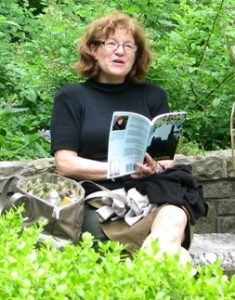Interview w/ Joan Gelfand
By Carol Smallwood
Posted on

Joan Gelfand’s reviews, stories, and poetry are in many national and international literary journals, including Rattle, Prairie Schooner, Kalliope, California Quarterly, Toronto Review, Marsh Hawk Review, and Levure Litteraire. She’s the Development Chair of the Women’s National Book Association and a member of the National Book Critics Circle. She also blogs for the Huffington Post and coaches writers. You can find out more about her here, as well as support the campaign for her new novel, Fear to Shred, here.
Please describe your duties as editor/writer.
I am a full time writer who speaks at conferences on getting published and on poetry and video. I coach writers around the country. Once a month, I host the San Francisco Poetry Podcast show which airs on line on U–Verse. I am also a member of Bay Area Travel Writers and have published articles on Germany, Victoria, Canada, Mexico and California to name a few. Currently, I am working with Publishizer to bring my first novel to market.
Tell us about your career.
I’ve been writing my whole life but only became serious about publishing about ten years ago. I have a BA and an MFA in Creative Writing. I’ve had poems and stories published in over 100 literary journals. In 2006 my first poetry collection, Seeking Center, was published by Two Bridges Press. In the subsequent eight years, two more poetry collections were published, and a chapbook of short fiction came out in 2010.
I’ve learned a lot about the publishing in my association with the Women’s National Book Association. I was the President of the San Francisco chapter, then recruited for National President in 2006. In 2010, I founded WNBA’s National Writing Contest. The contest has been a great success for WNBA and for honoring emerging writers.
Which recognitions/achievements have encouraged you the most?
Winning the Cervena Barva Fiction Award. The small press is an internationally known press. Also, winning an award from Poets 11, Judged by Jack Hirschman.
What writers have influenced you the most?
It’s a surprising list: Yoko Ono, Lawrence Ferlinghetti, Jonathan Franzen, Adrienne Rich, Toni Morrison, and more recently, Mary Mackey, Jane Ormerod and Richard Loranger.
How has the internet benefited you?
Very much so. For my last collection, The Long Blue Room, I created a Facebook fan page. Through that page I was able to reach fans around the globe! With one small ($29) boost to my page, I went from 200–1,200 followers! I sold over 200 books on Amazon for a total of 400 books of that collection. That is unusual for a poetry collection!
Also, submitting has become so much easier with the Submittable tool. I learn about contests and submission opportunities from multiple on line sources. Lastly, one of my recent ventures was into poetry films. The first film was a short movie created by a Los Angeles film maker, Dana Walden. With the help of YouTube, that film has gotten over 11,000 likes!
What classes have helped you the most?
I’m not a big fan of writing classes, especially when a writer is vulnerable, as there is the chance of getting too bruised by classes. I think my most helpful classes have been my small poetry critique group that meets twice a month and my one on one experiences of working with private editors.
What advice would you give others?
Practice patience. A writer has a timeline of measuring their success–or most do but the world has other timelines. Just wait until it’s your time. Also, be a Friend to Writers! Talk about other writer’s work, like them on FB , follow them on Twitter and don’t be above writing a fan letter once in a while. ALSO: read the writers you admire.
Don’t forget about community! It’s important to know and to spend time with the writers in your community and to do GOOD work for the community. That is an easy way to start to build your reputation–give of yourself. Volunteerism is really in a crisis but we need to keep it up. It is a critical task.
What is your favorite quotation?
“There are two tragedies in life. One is not getting what you want. The other is getting what you want.”
– Oscar Wilde.